Isaia Gonewai is a Fijian politician. He is a former member of the Senate of Fiji where he represented the Province of Nadroga-Navosa.
Isaia Gonewai is a Fijian politician. He is a former member of the Senate of Fiji where he represented the Province of Nadroga-Navosa.

Fiji, officially the Republic of Fiji, is an island country in Melanesia, part of Oceania in the South Pacific Ocean. It lies about 1,100 nautical miles northeast of New Zealand. Fiji consists of an archipelago of more than 330 islands—of which about 110 are permanently inhabited—and more than 500 islets, amounting to a total land area of about 18,300 square kilometres (7,100 sq mi). The most outlying island group is Ono-i-Lau. About 87% of the total population of 92,461 live on the two major islands, Viti Levu and Vanua Levu. About three-quarters of Fijians live on Viti Levu's coasts: either in the capital city of Suva; or in smaller urban centres such as Nadi—where tourism is the major local industry; or in Lautoka, where the sugar-cane industry is dominant. The interior of Viti Levu is sparsely inhabited because of its terrain.
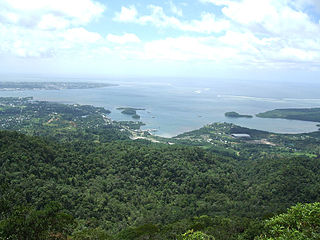
Suva is the capital of Fiji, and its largest metropolitan city. It is located on the southeast coast of the island of Viti Levu, in Rewa Province, Central Division.

Laisenia Qarase was a Fijian politician. He served as the sixth Prime Minister of Fiji from 2000 to 2006. After the military quashed the coup that led to the removal of Mahendra Chaudhry, Qarase joined the Interim Military Government as a financial adviser on 9 June 2000, until his appointment as Prime Minister on 4 July. He won two parliamentary elections, but a military coup removed him from power on 5 December 2006. He was later imprisoned on corruption charges brought by the military-backed regime.

The national flag of Fiji was adopted on 10 October 1970. The state arms have been slightly modified but the flag has remained the same as during Fiji's colonial period. It is a defaced cyan "Blue Ensign", with the shield from the national coat of arms. It has remained unchanged since Fiji was declared a republic in 1987, despite calls from some politicians for changes.

Brigadier-General Ratu Epeli Nailatikau, CF, LVO, OBE, MSD, KStJ, is a Fijian chief who was President of Fiji from 2009 to 2015. He has had a long career in the Military, diplomatic service, and government. From 2001 to 2006 he served as Speaker of the House of Representatives – the lower and more powerful chamber of the Fijian Parliament. He was also the chairman of the Parliamentary Appropriations Committee and of the House Committee. On 8 January 2007, he was appointed the interim Minister for Foreign Affairs and External Trade; he was moved to the post of interim Minister for Provincial Development and Multi-Ethnic Affairs in September 2008. In October 2008, he became Indigenous Affairs Minister "and effectively Great Council of Chiefs chairman". On 17 April 2009, he was appointed Vice-President by the Military government.

The president of Fiji is the head of state of the Republic of Fiji. The president is appointed by the Parliament for a three-year term under the terms of the 2013 Constitution of Fiji. Although not entirely a figurehead, the role of president in the government is largely ceremonial, but there are important reserve powers that may be exercised in the event of a crisis. In addition, the president is the commander-in-chief of the Republic of Fiji Military Forces.

The prime minister of Fiji is the head of government of the Republic of Fiji. The prime minister is appointed by the president under the terms of the 2013 Constitution of Fiji. The prime minister is the head of the Cabinet and appoints and dismisses ministers.

The Fijian coups d'état of 1987 resulted in the overthrow of the elected government of Fijian Prime Minister Timoci Bavadra, the deposition of Elizabeth II as Queen of Fiji, and in the declaration of a republic. The first coup d'état, in which Bavadra was deposed, took place on 14 May 1987; a second coup d'état on 25 September ended the monarchy, and was shortly followed by the proclamation of a republic on 10 October. Both military actions were led by Lieutenant Colonel Sitiveni Rabuka, then third in command of the Royal Fiji Military Forces.

Josaia Voreqe "Frank" Bainimarama is the 8th and current prime minister of Fiji since 2007. A member of the Fiji First Party, he began his career as a naval officer and commander of the Fijian Military Forces.
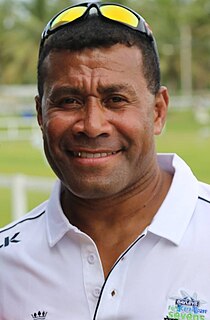
Waisale Tikoisolomoni Serevi is a Fijian former rugby union football player and coach, and is a member of the World Rugby Hall of Fame. Serevi is renowned for his achievements in rugby sevens, while also enjoying a long career in fifteen-a-side rugby at both club and national team levels. Nicknamed "The Wizard" by commentators, he is widely considered to be the greatest rugby sevens player in the history of the game. A biography of Serevi titled Waisale Serevi: King of Sevens by Nick Darvenzi was published in 2018.

The Fiji national rugby union team represents Fiji in men's international rugby union competes every four years at the Rugby World Cup, and their best performances were the 1987 and 2007 tournaments when they defeated Argentina and Wales respectively to reach the quarterfinals. Fiji also regularly plays test matches during the June and November test windows. Fiji also plays in the Pacific Tri-Nations, and has won the most Pacific Tri-Nations Championships of the three participating teams.
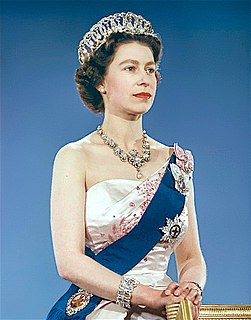
The monarchy of Fiji arose in the nineteenth century, when native ruler Seru Epenisa Cakobau consolidated control of the Fijian Islands and declared himself King or paramount chief of Fiji. In 1874, he voluntarily ceded sovereignty of the islands to Britain, which made Fiji a Crown colony within the British Empire.

The Fijian coup d'état of December 2006 was a coup d'état carried out by Commodore Frank Bainimarama, Commander of the Republic of Fiji Military Forces, against the government of President Josefa Iloilo. Iloilo was removed as president, but he was later reinstated by Bainimarama on 4 January 2007. The coup occurred as a continuation of the pressure which had been building since the military unrest of the 2000 Fijian coup d'état and 2005–06 Fijian political crisis.

Aiyaz Sayed-Khaiyum, is an Indo-Fijian politician and a cabinet minister. He is the Fijian attorney general and the Minister for Economy, Civil Service and Communications, and also serves the minister responsible for climate change. He is the third-highest polling candidate from the Fijian general elections of 2014 and 2018.
The history of the Jews in Fiji is intertwined with the settlement of the Fiji islands by European explorers and settlers. Most of these settlers arrive in Fiji via Australia and New Zealand.
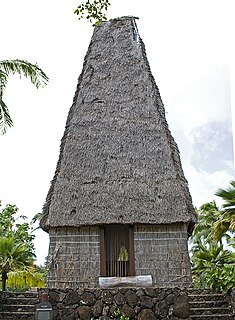
Religiously, Fiji is a mixed society with most people being Christian, with a sizable Hindu (27.9%) and Muslim (6.3%) minority, according to the 2007 census. Religion tends to split along ethnic lines with most Indigenous Fijians being Christian and most Indo-Fijians being either Hindu or Muslim.
Unlike the majority of Fiji's Indian population, who are descendants of Indian indentured labourers brought to Fiji between 1879 and 1916, most of the Sikhs came to Fiji as free immigrants. Most Sikhs established themselves as farmers. Sikhs also came to Fiji as policemen, teachers and preachers. In recent years large numbers of Sikhs have emigrated from Fiji, especially to the United States, Canada, the United Kingdom, Australia and New Zealand. Sikhs in Fiji are generally referred to as Punjabis.
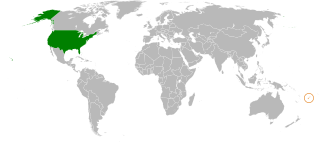
Fiji–United States relations are the bilateral relations between the Fiji and the United States. The relationship has improved significantly since Fiji's elections in September 2014, which restored a democratically elected government to Fiji for the first time since 2006. The United States had opposed Fiji's unelected government, which came to power through a military coup in December 2006.
Indo-Fijians or Indian-Fijians are Fijian people of Indian descent and include people who trace their ancestry to various regions of the Indian subcontinent. Although Indo-Fijians constituted a majority of Fiji's population from 1956 through the late 1980s, discrimination and the resulting brain drain resulted in them numbering 313,798 (37.6%) out of a total of 827,900 people living in Fiji as of 2007.

Ratu Wiliame Maivalili Katonivere is a Fijian chief and politician who is the president of Fiji since 2021. He has also been the chief of Macuata Province since 2013, succeeding his older brother Aisea Katonivere, and was previously involved in conservation initiatives of Fiji's Great Sea Reef.